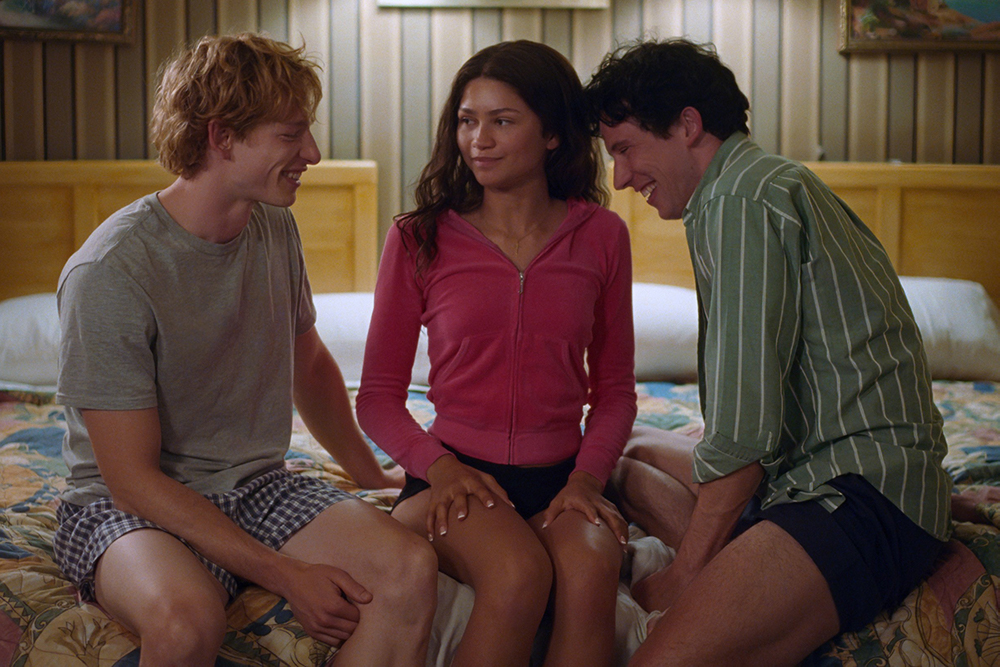Five Nights at Freddy's—Exciting Game Adaptation or Boring Snoozefest?
In light of the trailer release for the Five Nights at Freddy's sequel, it’s due time to talk about the first movie.


In a world plagued by black and white sentiments of romance, Luca Guadagnino’s Challengers aims to paint over these lines—highlighting the brilliantly vivid spectrum of human bonds.
From the very opening sequence, Art Donaldson (Mike Faist) and Patrick Zweig (Josh O’Connor) are head-to-head in an intense tennis match as an audience, with Tashi Duncan (Zendaya) in the front and center, watches on. It is after this scene, from a myriad of flashbacks placed carefully and deliberately throughout the rest of the film, that the unspoken tension between the three characters is expanded upon. Teenage Art and Patrick, once best of friends, meet Tashi—a headstrong female tennis player with more than enough potential and skill to pursue a professional career—and both immediately pine for her. Tashi, knowing this and sensing the intimate connection between Art and Patrick, strings them both along—making out with the both of them before directing them to each other before leaning back to watch the two boys now kissing, basking in the satisfaction of her doing. Before leaving, she pits the two against each other—promising that the winner of their tennis match the following day would receive her number. Patrick would come to win the match against Art, becoming her boyfriend. Why is it, then, that Art ultimately becomes Tashi’s husband and not Patrick?

Some time later, Patrick and Tashi get into a heated fight before one of Tashi’s tennis matches—leading to a career-ending injury and an explosive break-up, with Art siding with Tashi against his best friend. Despite her own path now cut short, Tashi isn’t deterred from continuing to pull the strings behind the scenes. She steps into a kingmaker role after becoming Art’s new tennis coach—seemingly willing to do anything to push Art to greatness again. It begs the question whether she is acting out of Art’s best interest or her own—a similar sentiment to how she’d treated Patrick as a boyfriend throughout college. As Art falls into a slump, she orchestrates a master plan in order to help Art regain his footing in the professional scene—involving the very rift she’d created in the first place. It’s powerful, devious—and combined with Zendaya’s confident portrayal, it’s masterful.
Though Guadagnino does not give his audience enough time to piece together the overarching symbolism before handing it over on a silver platter, the metaphor itself is executed expertly. Using tennis as its focal point, Challengers demonstrates the push and pull of connections between people—beginning all the way back from psychosexual development between Art and Patrick from when they were pre-teens and leading eventually, years later, into a messy yet colorful throuple dynamic with Tashi.
While the two heterosexual relationships are explored extensively, the same-sex relationship between Art and Patrick—especially as lines blurred between platonic and romantic—is not as well-defined. Without this third and equally important side, the story becomes more shallow—presenting itself more as a loveless cheating narrative rather than one displaying the various facets of love as the film intended. After Art and Patrick’s falling out, both men clearly lose sight of their passion for tennis, becoming worse off as a result. The ending then knits them back together, both remembering their love for the sport and each other, placing major significance on the relationship between them. Unfortunately, due to the lack of depth, the abrupt ending comes off as confusing and inadequate.

The result overall gives us a moving story about the grittier, uglier aspects of love. Accompanied by an evocative music score and outstanding performances, it lends itself well in weaving a unique and creative tale unbound by the limits of prejudice.
Related lists created by the same author
In light of the trailer release for the Five Nights at Freddy's sequel, it’s due time to talk about the first movie.
Related diversity category
This sports drama movie is centered around an Asian American boy named Chang.